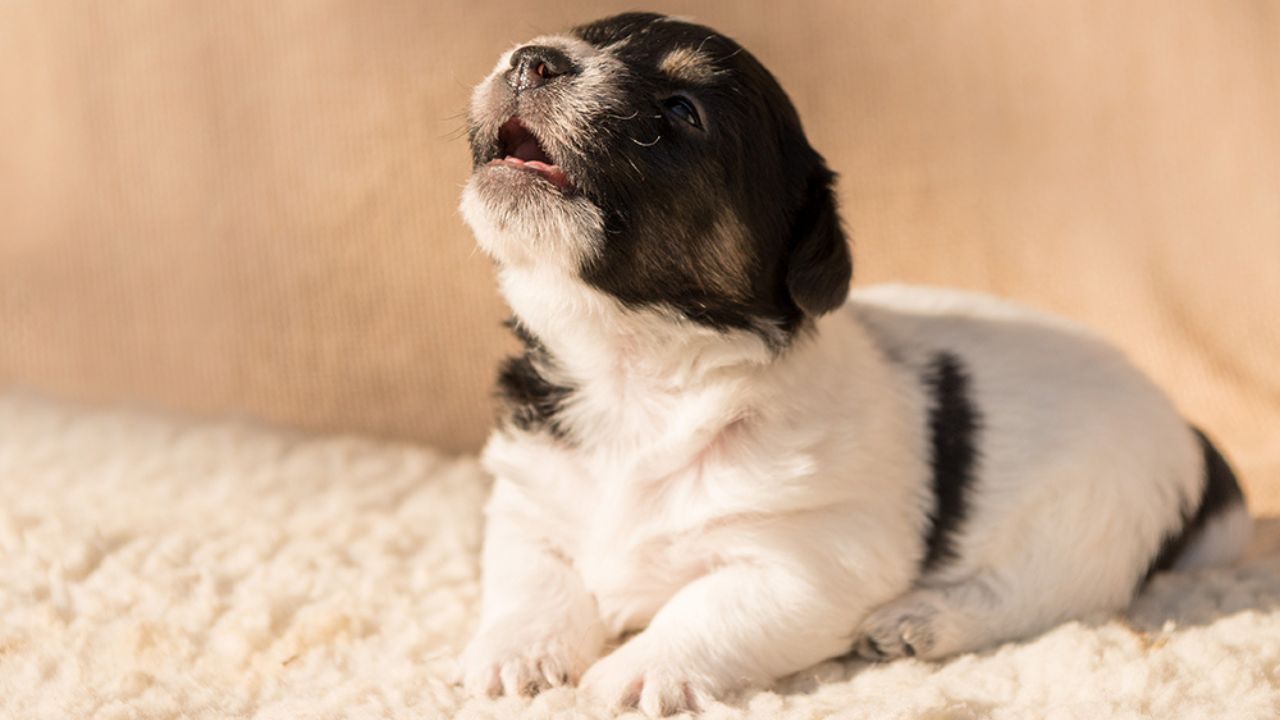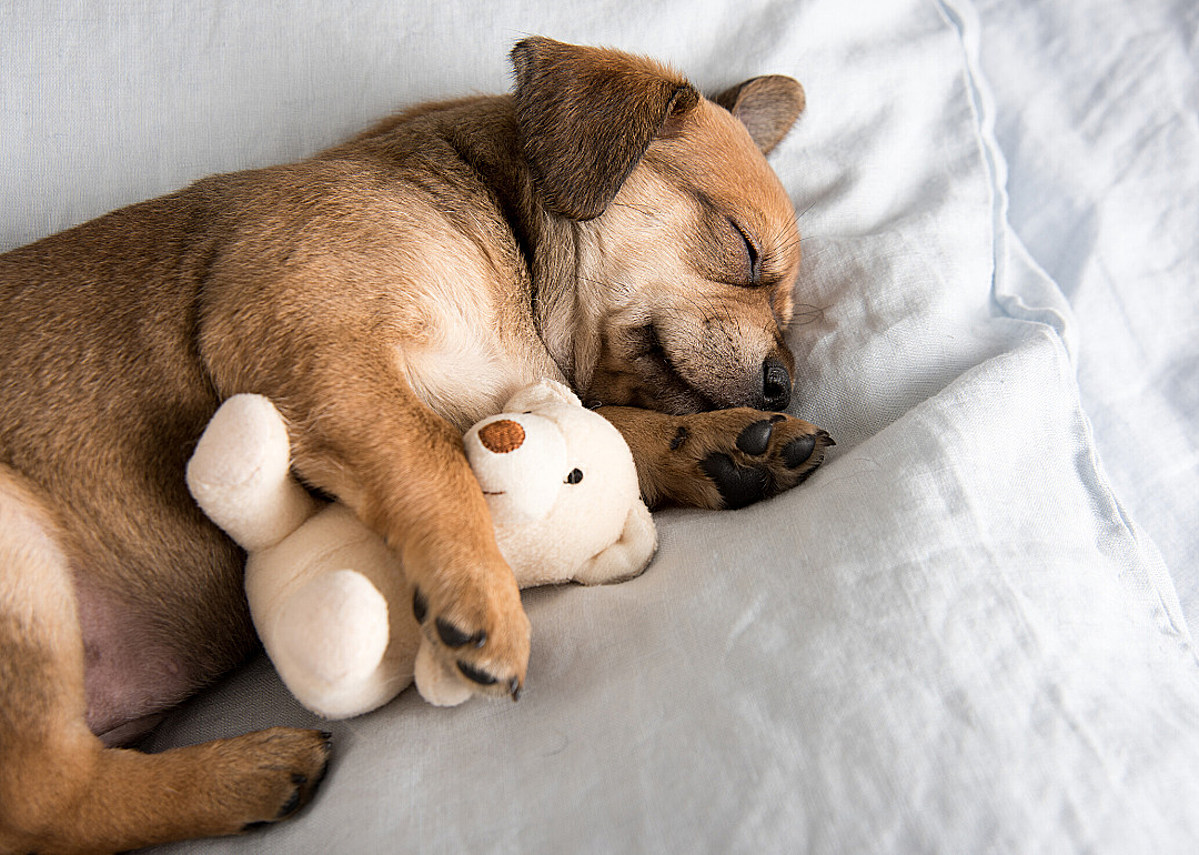
Bringing a new puppy home can be an exciting and joyous experience, but it can also be challenging, especially when understanding your pup’s behavior. One of the most common concerns of new puppy owners is why their little furry friend is crying in their sleep.
Now, I know what you’re thinking. You’re probably imagining a tiny, helpless puppy, snuggled up in a cozy bed, letting out little whimpers and yelps as they dream of chasing rabbits and digging holes in the backyard. It’s heart-wrenching, and you’re probably wondering how to help your little buddy.
Well, fear not! In this article, we’ll explore the common reasons why newborn puppies cry in their sleep, how to identify the cause of your puppy’s crying, and offer tips to soothe it. We’ll even talk about when to seek veterinary care and give examples of how other new puppy owners have dealt with this common issue. So, let’s dive in!
Common Reasons Newborn Puppies Cry in their Sleep
As a new puppy owner, it’s essential to understand that crying in sleep is a natural behavior in newborn puppies. However, it can be challenging to identify why your little pup is crying, especially if you’re a first-time owner. Below are the common reasons why your newborn puppy might be crying in their sleep:
Hunger and Thirst
Just like human babies, newborn puppies have tiny stomachs and must eat frequently. If your puppy cries in their sleep, it could be a sign that they’re hungry or thirsty. According to veterinary experts, puppies up to six months old should eat at least three times a day, while puppies younger than three months may need to eat as many as six small meals per day.
Pro Tip: If your puppy is crying in their sleep, try feeding them a small meal or offering them some water before bedtime. This may help them sleep more soundly.
Need to Eliminate
Another common reason why newborn puppies cry in their sleep is that they need to eliminate. Puppies have small bladders and may need to pee or poop frequently, especially during the first few weeks of life.
Pro Tip:
- Make sure your puppy has access to a designated potty area.
- Take them outside frequently, especially after they eat.
- Drink.
- Wake up from a nap.
This will help prevent accidents and promote healthy elimination habits.
Cold or Hot Temperature
Newborn puppies cannot regulate their body temperature, so they can easily get too cold or too hot. If your puppy cries in their sleep, it could be a sign that they’re too cold or hot.
Pro Tip:
Ensure your puppy’s sleeping area is warm and draft-free, and provide them with a cozy bed and blankets to snuggle up in. Also, avoid keeping your puppy in areas that are too hot, which can lead to dehydration and discomfort.
Discomfort or Pain
Sometimes, newborn puppies cry in their sleep because they’re uncomfortable or in pain. This could be due to an injury, illness, or teething.
Pro Tip:
If your puppy’s crying persists, or you notice other signs of discomfort or pain, such as limping, vomiting, or diarrhea, you must seek veterinary care immediately.
Illness and Medical Issues
One common medical issue that can cause crying in sleep is hypoglycemia. Hypoglycemia is when the puppy’s blood sugar drops to dangerously low levels, causing weakness, lethargy, and even seizures.
Pro Tip:
Puppies are susceptible to respiratory infections, especially if they are not fully vaccinated. If your puppy’s crying is accompanied by wheezing, coughing, or difficulty breathing, it’s important to seek veterinary care immediately.
Separation Anxiety
Finally, it’s common for puppies to experience separation anxiety, especially during the first few weeks after being separated from their mothers and littermates. This can lead to crying and whining in their sleep.
Pro Tip:
Try to create a sense of security and routine for your puppy, such as keeping their sleeping area close to your bed, using a comforting toy or blanket, or providing them with a consistent daily routine.
Finally, if your newborn puppy is crying in their sleep, it’s essential to identify the cause and address it promptly. By addressing common reasons such as hunger, elimination, temperature, discomfort, and separation anxiety, you can help your little furry friend get the rest they need to grow healthy and happy.
How to Identify the Reason for Your Puppy’s Crying
Identifying the cause of your puppy’s crying can be tricky, but it’s important. Understanding why your puppy cries in their sleep can help you provide the best care possible and ensure their comfort and well-being.
Observe Your Puppy’s Behavior
One of the best ways to identify the cause of your puppy’s crying in their sleep is by observing their behavior during the day. Does your pup seem restless or agitated? Do they need help eliminating? These can be signs that your puppy is uncomfortable or in pain, and it may be affecting their sleep.
Signs of Discomfort or Illness
It’s also important to check for any signs of discomfort or illness. Is your puppy experiencing diarrhea or vomiting? These can indicate an underlying medical issue that may be causing your puppy to cry in their sleep.
Puppy’s Routine or Environment
Sometimes, a change in puppies’ sleep routine or environment can be stressful for your puppy and affect their sleep. Have you recently moved or introduced a new pet to your home? Has your puppy started a new medication or diet? These changes can cause anxiety or discomfort, and it’s important to note them.
Puppy’s Age and Development
It’s also important to consider your puppy’s age and development when trying to identify the cause of their crying in their sleep. Newborn puppies may cry in their sleep simply because they miss the warmth and comfort of their littermates. Older puppies may be teething or experiencing separation anxiety.
Observed Patterns or Triggers
Finally, it’s important to take note of any patterns or triggers that may be causing your puppy to cry in their sleep. Does your puppy always cry at a certain time of night? Is there a particular noise or smell that seems to trigger their crying? These observations can help you pinpoint the cause of your puppy’s crying and make changes to help them sleep better.
By observing your puppy’s behavior, checking for physical signs of discomfort or illness, and considering their age and development, you can identify the cause of their crying in their sleep and make changes to help them sleep better. So, grab a notebook and take notes on your puppy’s behavior – you never know what insights you might uncover!
Tips to Soothe Your Crying Puppy
Every puppy is unique, and what works for one may not work for another. Be patient and experiment with different soothing techniques until you find what works best for your little furry friend. Below are some tips to soothe your puppies crying in their sleep:
Feeding and hydrating your puppy before bedtime: Puppies have small stomachs and must eat and drink frequently to stay healthy and happy. If your puppy cries in its sleep, it may be hungry or thirsty. Make sure to feed your puppies nutritious meals and provide access to clean water before bedtime to ensure they are comfortable and satisfied throughout the night.
Creating a comfortable sleeping environment: Just like humans, puppies need a cozy and comfortable sleeping environment to rest peacefully. Ensure your puppy has a clean and soft bed to sleep in, away from any noisy or bright areas of the house. You can add blankets or pillows to make the bed even more inviting for your little furry friend.
Providing a warm and cozy bed: Puppies are sensitive to temperature and can easily become too hot or cold. Ensure your puppy’s bed is in a warm, draft-free area of your house, away from any air conditioning vents or windows. You can also consider adding a heat source, such as a heating pad or hot water bottle, to keep your puppy warm and cozy throughout the night.
Consoling your puppy with gentle touch or sound: Puppies are social creatures and often crave physical contact and attention from their owners. If your puppy cries in their sleep, try comforting them with gentle touches or sounds, such as petting them, singing or humming a lullaby, or playing soothing music. This can help your puppy feel secure and loved, reducing their anxiety.
When to Seek Veterinary Care
We all love our puppies and want them to be healthy and happy, but sometimes their crying can indicate a more serious issue that requires veterinary attention. Here are some signs that your puppy’s crying may indicate a medical issue:
Excessive crying: If your puppy’s crying seems more frequent or intense than usual, it could indicate an underlying medical issue. This could include anything from an infection to a neurological disorder.
Lethargy: If your puppy seems unusually tired or sluggish, it could be a sign that they’re not feeling well. This could be a symptom of an infection, anemia, or even a serious disease.
Loss of appetite: If your puppy isn’t eating or drinking as much as usual, it could be a sign that they’re not feeling well. Loss of appetite could be a symptom of several medical issues, including infections, digestive problems, or dental issues.
Changes in behavior: If your puppy is suddenly more irritable, anxious, or lethargic than usual, it could be a sign of an underlying medical issue. This could include anything from a fever to a more serious neurological issue.
If you notice any of these signs, it’s important to seek veterinary care as soon as possible. Your veterinarian will be able to examine your puppy and run any necessary tests to determine the cause of their crying and any other symptoms. Depending on the diagnosis, your vet may prescribe medication, recommend changes to your puppy’s diet or routine, or even recommend surgery.
Remember, as a new puppy owner; it’s always better to err on caution regarding your pup’s health. You can help ensure your furry friend stays healthy and happy for years by staying vigilant and seeking veterinary care when necessary.
Conclusion
It’s important to understand that newborn puppies crying in their sleep is a common issue, and there are several reasons why this may be happening. Hunger, discomfort, and separation anxiety are just a few possible reasons your puppy may snore loudly. By identifying the cause of your puppy’s crying and addressing it, you can help your little furry friend feel more comfortable and get a better night’s rest.
So, don’t fret if your newborn puppy is crying in their sleep. With patience, love, and attention, you’ll soon have a well-rested and happy little companion. Thank you for reading, and we wish you and your furry friend all the best on your journey together!
FAQ
Why Is My Newborn Puppy Whining For No Reason?
The reasons behind a puppy’s cries can differ based on their age. Older puppies might whimper due to separation anxiety, boredom, or the need to relieve themselves outside. Conversely, newborn puppies may cry when they’re hungry, uncomfortable, or seeking warmth.
Is it Normal For Puppies To Cry When They Are Born?
Newborn puppies come into the world with their eyes and ear canals sealed shut. During this early stage of life, their primary activities include sleeping and nursing. When they need attention or care, they communicate by crying or whining, seeking comfort from their mother. At this vulnerable stage, puppies depend entirely on their mother for essentials like food, grooming, and a safe, cozy place to rest.
How Do You Calm a Crying Newborn Puppy?
Dimming the lights, particularly at night, is a helpful strategy for helping your puppy relax and settle down before bedtime. This subdued lighting creates a calming environment, making it easier for your puppy to become drowsy. Additionally, using distractions such as interactive toys or puzzle games can redirect a crying puppy’s attention and provide the mental stimulation it requires.
Why Is My 2-Day-Old Puppy Crying So Much?
If a puppy cries continuously, especially after its basic needs have been met, it could indicate pain or discomfort. Persistent crying is a sign that the puppy needs medical attention. Sudden changes in a newborn puppy’s behavior, like increased lethargy or no more nursing, warrant a vet visit.
Should I Let My Puppy Cry It Out?
You should never leave a puppy to cry when it needs the basics, as this can cause difficulties with training later. Your puppy may cry when it is left alone, perhaps if you’re elsewhere in the house or asleep.








